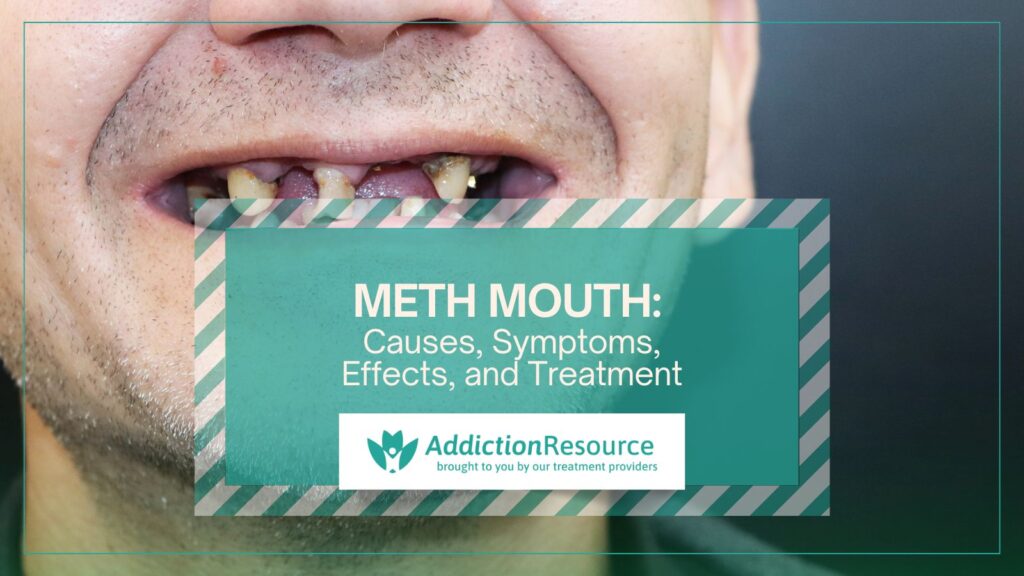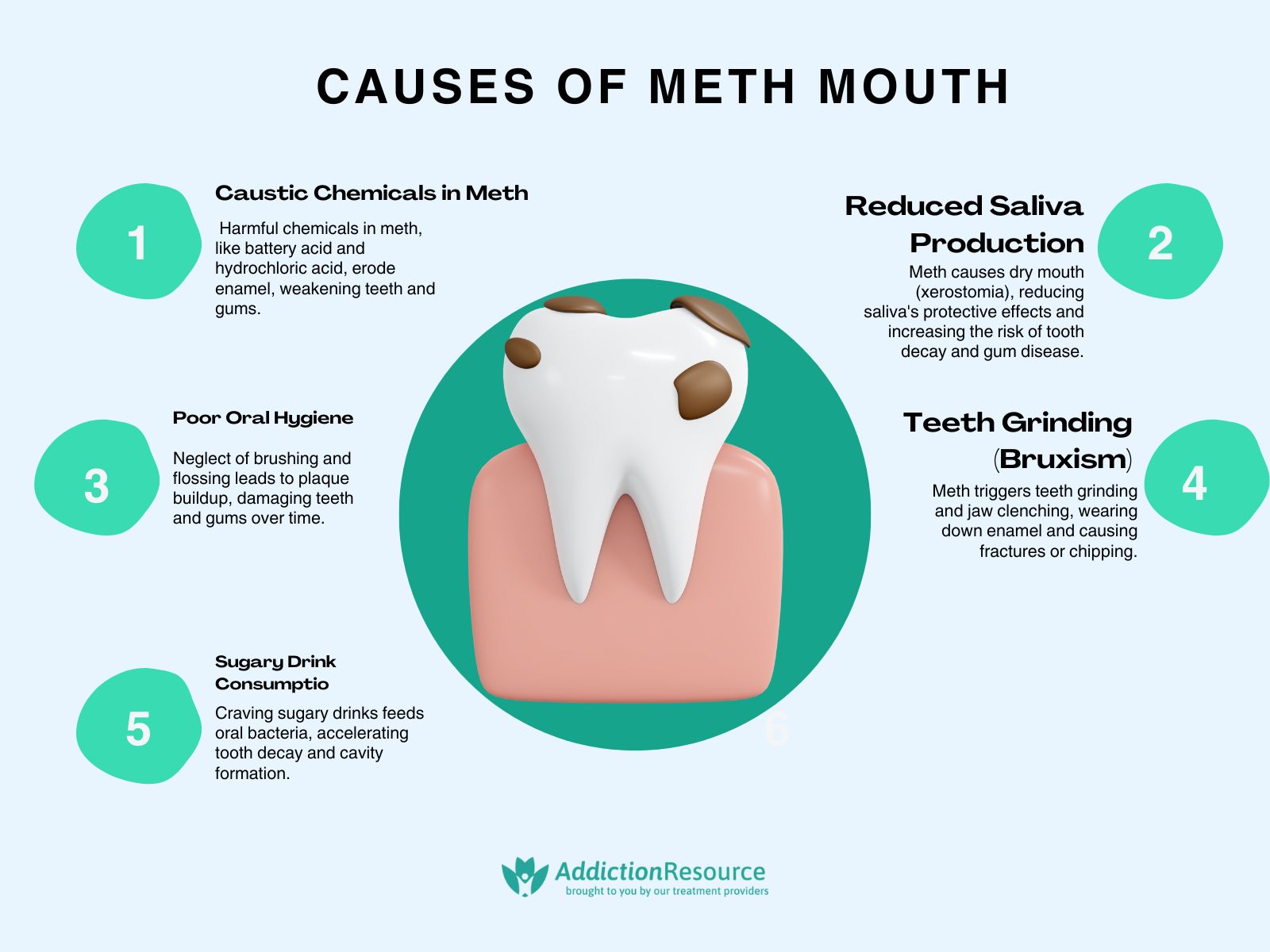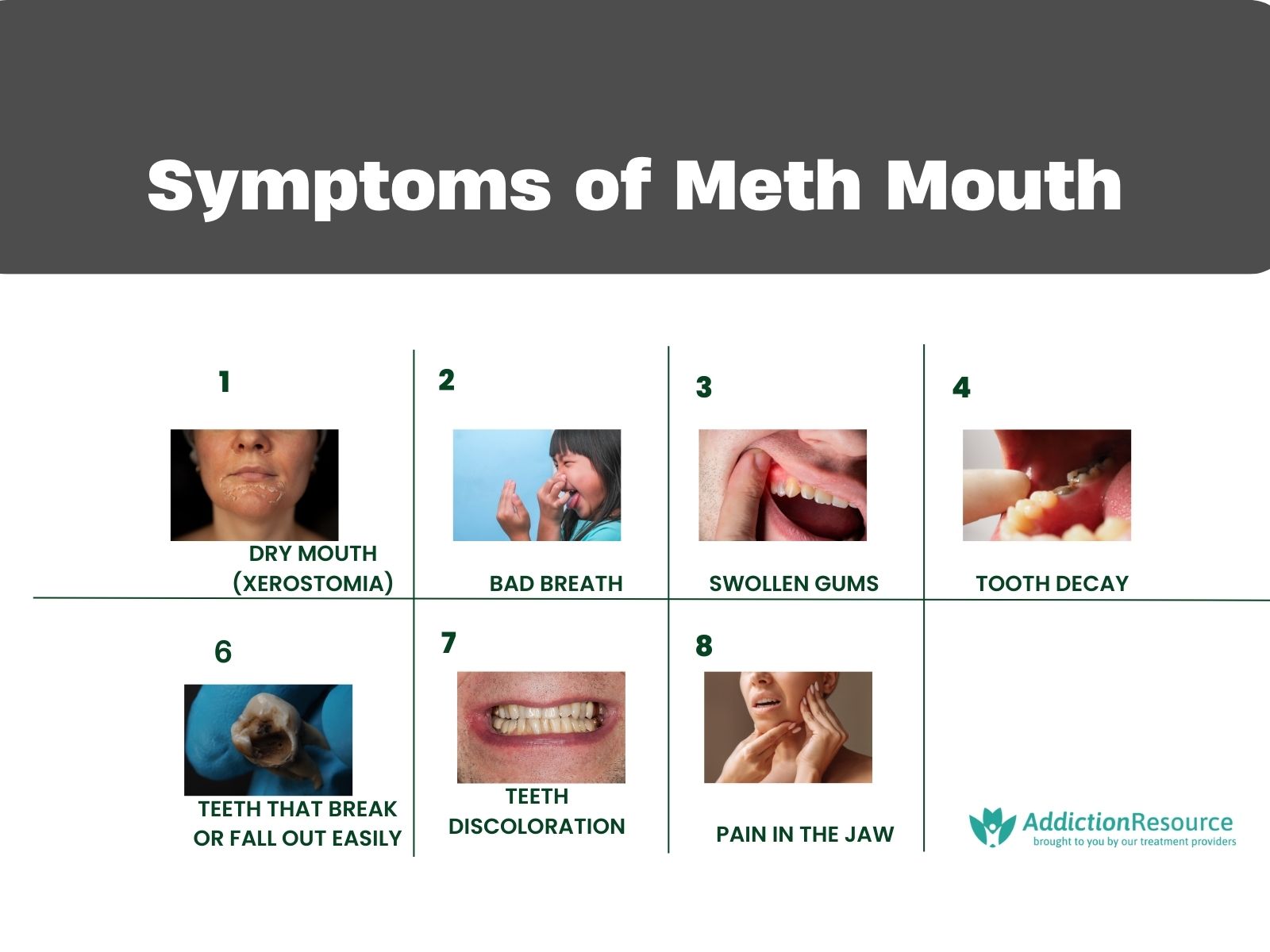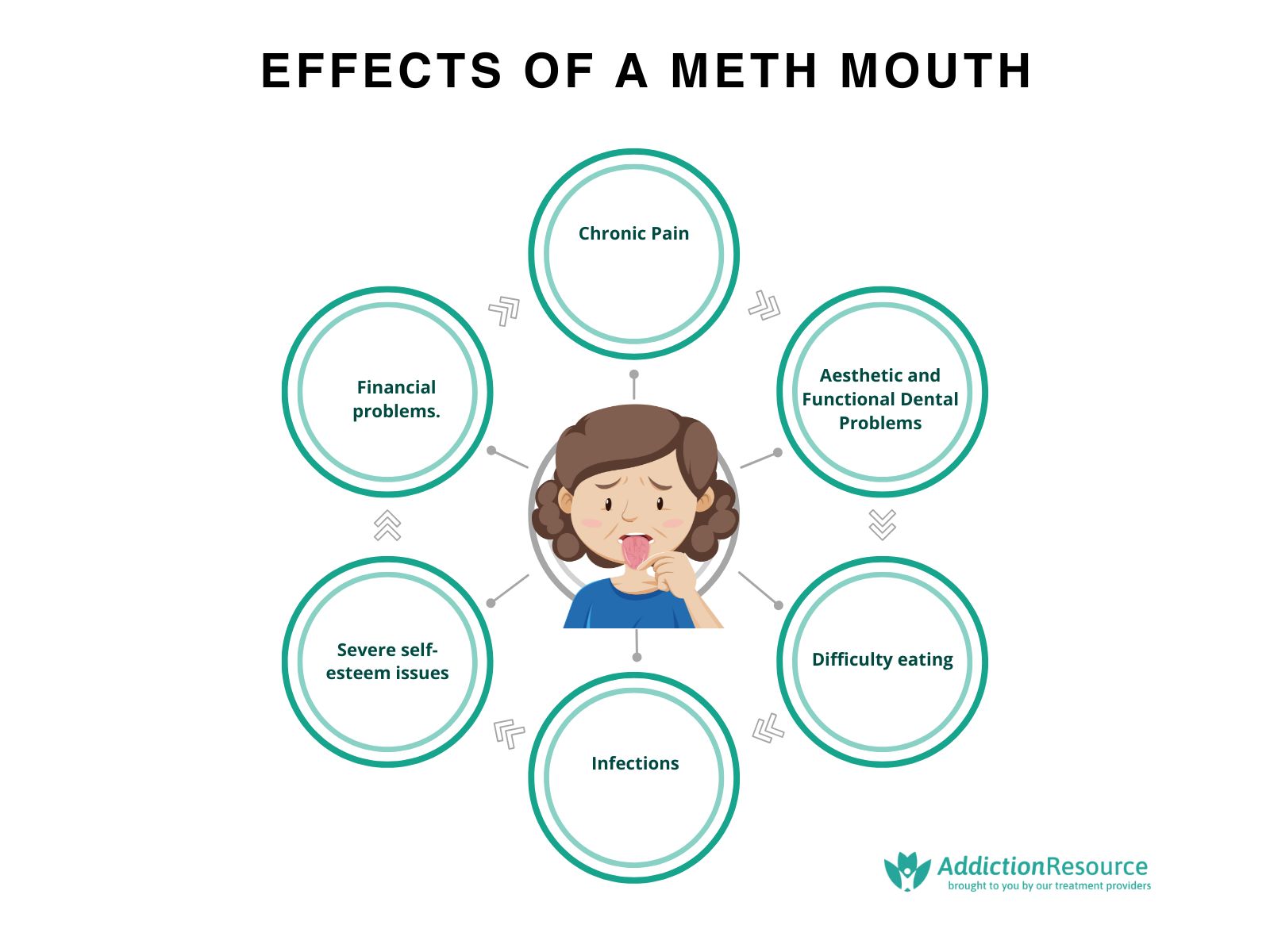Meth Mouth: Causes, Symptoms, Effects, and Treatment

Meth mouth is the severe dental decay and gum disease caused by prolonged methamphetamine use. Meth mouth leads to broken, stained, or missing teeth, known as meth teeth.
The causes of meth mouth are a combination of meth’s impact on saliva production, poor oral hygiene, teeth grinding, and frequent consumption of sugary drinks by users. The main symptoms of meth mouth include dry mouth (xerostomia), bad breath, cottonmouth, swollen gums, tooth decay, and teeth that may break or fall out easily.
The effects of meth mouth are severe and devastating, including chronic pain, aesthetic and functional dental problems, difficulty eating, infections, and severe self-esteem issues. Treatment options for a meth mouth include professional dental restoration treatments such as fillings, crowns, implants, extractions, and dentures. Improved oral hygiene and addressing meth addiction are essential for full recovery. Full-mouth reconstruction may be needed in severe cases.
Table Of Contents:
What is a Meth Mouth?
Meth mouth is a severe dental condition characterized by extensive tooth decay, gum disease, and tooth loss, commonly seen in individuals addicted to methamphetamine, according to the research titled “Meth Mouth—A Growing Epidemic in Dentistry?” by Andreas Pabst and Juan Carlos Castillo-Duque, published by the National Library of Medicine. Meth mouth stems from the drug’s harmful effects on oral health, including dry mouth, teeth grinding, and poor hygiene habits often associated with substance use.
Methamphetamine use, which impacts saliva production and promotes poor oral hygiene, is rising in the United States, with an estimated 1.6 million Americans using meth annually, according to the study titled “Understanding the Basis of METH Mouth Using a Rodent Model of Methamphetamine Injection, Sugar Consumption, and Streptococcus mutans Infection” by Hiu Ham Lee a and Preethi Sudhakara. Meth consumption has increased nearly seven to eight times over the past decade in the United States.
Meth users experience symptoms like dry mouth (72%), jaw clenching (68%), and pain in the temporomandibular joint (47%), all of which contribute to meth mouth, according to the research titled “Sympathomimetic effects of chronic methamphetamine abuse on oral health: a cross-sectional study” by Nils H. Rohleder, Steffen Koerdt, and Stefan Wagenpfeil.
What are the Causes of a Meth Mouth?

The causes of a meth mouth are caustic chemicals in meth, meth’s impact on saliva production, poor oral hygiene, teeth grinding, and frequent consumption of sugary drinks by users.
These 5 causes of a meth mouth are explained below.
- Caustic Chemicals in Meth: Methamphetamine contains chemicals like battery acid, ammonia, and hydrochloric acid, according to the study titled “Feb 10, 2003: How do you make methamphetamines?” published by the Vanderbilt University Medical Center. These chemicals directly damage teeth and gums. These substances erode enamel, making teeth vulnerable to decay and breakage.
- Meth’s Impact on Saliva Production: Meth use significantly reduces saliva production, leading to a dry mouth (xerostomia), according to the research titled “Effects of Methamphetamine Withdrawal on the Volume and pH of Stimulated Saliva” by Haleh Zokaee and Shima Fathi. Without saliva to wash away bacteria and neutralize acids, the risk of tooth decay and gum disease increases.
- Poor Oral Hygiene: Meth users often neglect basic oral hygiene due to their addiction and related behavior, such as neglecting responsibilities and staying high all the time. This lack of brushing and flossing allows plaque to build up and damage teeth and gum.
- Teeth Grinding: Meth induces teeth grinding (bruxism) and jaw clenching, which wear down enamel over time, as stated in the study “Methamphetamine Use and Dental Problems Among Adults Enrolled in a Program to Increase Access to Oral Health Services for People Living with HIV/AIDS” by Angela W Walter. Teeth grinding leads to chipped or fractured teeth, further worsening oral health.
- Frequent Consumption of Sugary Drinks: Meth users crave sugary drinks, such as soda, to deal with dry mouth and energy crashes, according to the study titled “Soda Consumption Among Methamphetamine Users in the U.S.: Impact on Oral Health” by Debra A Murphy and Lauren Harrell published by the National Library of Medicine. The sugar feeds bacteria in the mouth, leading to rapid tooth decay and cavities.
What are the Symptoms of Meth Mouth?

The main symptoms to identify a meth mouth are dry mouth (xerostomia), bad breath, swollen gums, tooth decay, teeth that may break or fall out easily, and pain in the jaw.
These 7 symptoms of a meth mouth are listed below.
- Dry Mouth (Xerostomia): Dry mouth, or xerostomia, is a condition where the mouth produces little to no saliva. Meth causes this by damaging salivary glands, leaving the mouth unprotected against bacteria and acids, which speeds up tooth decay, as stated in the study titled “Etiology of xerostomia and dental caries among methamphetamine abusers” by Paul C Edwards and Nicole S Kimmes.
- Bad Breath: Bad breath, known as halitosis, is common in meth mouth due to poor oral hygiene and bacterial buildup, according to the study titled “Oral Manifestations of “Meth Mouth”: A Case Report” by Ilser Turkyilmaz. The decaying teeth and gum infections further contribute to the foul odor.
- Swollen Gums: Swollen gums occur when bacteria infect and irritate the gums due to prolonged meth use. Swollen gums lead to gum disease, bleeding, and even receding gums with time.
- Tooth Decay: Tooth decay happens when the enamel breaks down, leaving teeth vulnerable to cavities. Meth users develop multiple cavities quickly which leads to tooth decay, making chewing and eating difficult, according to the study titled “Dental disease patterns in methamphetamine users: Findings in a large urban sample” by Vivek Shetty and Lauren Harrell.
- Teeth That Break or Fall Out Easily: Prolonged meth use makes teeth brittle, weak, and prone to breaking. Tooth decay or gum damage leads to teeth falling out entirely in severe cases.
- Teeth Discoloration: Teeth discoloration is the most significant symptom of meth mouth, with teeth turning yellow, brown, or even black, as stated in the study titled “Dental Considerations in the Management of Meth Mouth: A Case Report” by Narendra A Basutkar, Asmaa Bokhari, and Othman Wali. This happens due to enamel erosion, plaque buildup, and exposure to harsh chemicals in meth.
- Pain in the Jaw or Temporomandibular Joint (TMJ): Jaw pain or soreness is common due to teeth grinding and clenching caused by meth. The constant pain leads to Temporomandibular joint (TMJ) issues and difficulty opening or closing the mouth, as stated in the study titled “Sympathomimetic effects of chronic methamphetamine abuse on oral health: a cross-sectional study” by Klaus-Dietrich Wolff and Marco R. Kesting.
What are the Effects of a Meth Mouth?

The main effects of a meth mouth are chronic pain, aesthetic and functional dental problems, difficulty eating, infections, severe self-esteem issues, and financial problems.
These 6 effects of a meth mouth are described below.
- Chronic Pain: Chronic pain is one of the most annoying and bothering effects of meth mouth. Decayed teeth, swollen gums, and exposed nerves lead to constant discomfort, making even simple activities like talking or smiling painful.
- Aesthetic and Functional Dental Problems: Meth mouth leaves teeth discolored, broken, or missing, creating both cosmetic and functional challenges. The damage affects speech, chewing, and the appearance of your mouth.
- Difficulty Eating: Eating becomes a struggle when teeth are decayed or missing. Pain and weakened chewing ability make it hard to enjoy food and eventually result in poor nutrition and weight or muscle loss.
- Infections: Infections are common when tooth decay and gum disease are left untreated. Severe infections spread to other parts of the body, posing serious health risks like abscesses or systemic illnesses, according to the study titled “Understanding the Basis of METH Mouth Using a Rodent Model of Methamphetamine Injection, Sugar Consumption, and Streptococcus mutans Infection” by Kildare Miranda.
- Severe Self-Esteem Issues: Missing and damaged teeth lead to embarrassment, social withdrawal, and self-esteem issues. Many individuals with meth mouths avoid smiling, talking, or interacting with others because of low confidence.
- Financial Problems: Treating meth mouth is costly, with extensive dental procedures like extractions, implants, or dentures required. The expense causes financial stress, especially for those already struggling with addiction.
What are the Treatment Options for a Meth Mouth?
The treatment options for a meth mouth are dental restoration treatments, improving oral hygiene, rehab programs to address addiction, prevention and maintenance, nutritional support, and pain management.
These 6 treatment options for a meth mouth are listed below.
- Dental Restoration Treatments: Dental restoration treatments like fillings, crowns, implants, extractions, and dentures help repair or replace damaged teeth, as proved in the study titled “Comprehensive dental treatment for “meth mouth”: A case report and literature review” by Panpan Wang and Xinmei Chen. Dentists focus on saving teeth when possible, but severe cases require extractions and prosthetic solutions like implants or dentures to restore appearance.
- Improving Oral Hygiene: Improving and practicing proper oral hygiene, such as brushing twice daily, flossing, and using mouthwash, helps prevent further damage. Regular dental check-ups and cleanings are essential to manage and improve oral health after meth use.
- Rehab Programs to Address Addiction: Treating meth addiction is essential to prevent further dental damage. Rehab programs provide counseling, medical care, and support to help individuals overcome their addiction while they are getting treatments for their meth mouths, and reduce the risk of relapse.
- Prevention and Maintenance: Preventing future damage involves maintaining good oral hygiene and adopting healthy habits, such as avoiding sugary drinks and smoking. It’s important to be consistent with dental visits and fluoride treatments to strengthen teeth and gums over time.
- Nutritional Support: Nutritional support, such as a balanced diet rich in vitamins and minerals promotes oral health recovery. Foods high in calcium, vitamin D, and antioxidants help rebuild strength in teeth and gums.
- Pain Management and Infection Control: Pain relief medications and antibiotics are prescribed in cases of severe and chronic pain and infections. Ideal pain medications for dental pain are acetaminophen and ibuprofen, as stated in the study titled “Selection of analgesics for the management of acute and postoperative dental pain: a mini-review” by Sung-Jin Kim and Jeong Taeg Seo.
What is a Meth jaw?
Meth jaw refers to the damage methamphetamine causes to the jaw, including pain, swelling, and dysfunction in the temporomandibular joint (TMJ). Chronic teeth grinding (bruxism) and jaw clenching strain the jaw muscles and joints. This can lead to severe jaw pain, limited movement, and long-term dental misalignment over time.
What are Meth teeth?
Meth teeth refers to the severe dental decay and damage caused by methamphetamine use. Teeth become discolored, brittle, and prone to breaking due to the drug’s harmful chemicals, dry mouth, and poor oral hygiene.
What are Meth lips?
Meth lips are a condition where methamphetamine use causes cracking, sores, and dryness around the lips. This happens due to dehydration, constant lip-licking, and exposure to caustic meth chemicals. Meth lips can result in painful splits, infections, and a visibly damaged appearance.
What is Crystal Meth?
Crystal meth, or crystal methamphetamine, is a highly addictive stimulant drug, appearing as clear or bluish-white glass-like shards. Crystal meth produces a rapid and intense euphoria by increasing dopamine levels in the brain, which drives its high potential for addiction, according to the study titled “Methamphetamine” published by the National Institute on Drug Abuse. Crystal meth drug is smoked, snorted, injected, or swallowed, leading to severe health risks, including dental decay, skin sores, and long-term cognitive impairments.
Can crystal meth addiction lead to meth mouth?
Yes, crystal meth addiction can lead to a meth mouth. Crystal meth reduces saliva production and creates a dry environment where bacteria thrive and tooth enamel vanishes quickly. Combined with poor oral hygiene, teeth grinding, and frequent consumption of sugary drinks, crystal meth addiction increases the risk of severe dental decay and gum disease.
What does meth mouth look like?
Meth mouth looks like a combination of decayed, discolored, and broken teeth, along with swollen gums and sores in the mouth. Teeth appear yellow, brown, or black due to plaque buildup and enamel erosion. Individuals experience tooth loss in severe cases, which makes the damage visible even when the mouth is closed.
Does meth cause tooth decay?
Yes, meth use can cause tooth decay. The drug’s chemicals weaken enamel, while reduced saliva flow eliminates the mouth’s natural protection against harmful bacteria. This decay quickly leads to cavities and tooth loss due to poor oral hygiene.
Is meth mouth permanent?
No, meth mouth is not permanent, but the damage can be severe and require detailed and long-term dental procedures. Severe cases involving tooth loss or gum disease require lifelong maintenance, including implants, dentures, or fillings.
Why do meth addicts lose their teeth?
Meth addicts lose their teeth due to factors like severe tooth decay, gum disease, and enamel erosion. The drug’s caustic chemicals weaken teeth, while dry mouth triggers bacterial growth, and habits like grinding and clenching accelerate damage.
What is the difference between meth mouth and meth sores?
The difference between a meth mouth and meth sores is that meth mouth is linked to oral health issues, and meth sores are caused by compulsive picking at the skin (meth-induced psychosis) or irritation from meth’s chemical residues. Meth mouth is the severe dental decay and oral damage caused by methamphetamine use, including tooth discoloration, cavities, and gum disease. On the other hand, meth sores are painful lesions or ulcers that develop on the skin, lips, or inside the mouth.
Hope Without Commitment
Find the best treatment options. Call our free and confidential helpline
Most private insurances accepted





